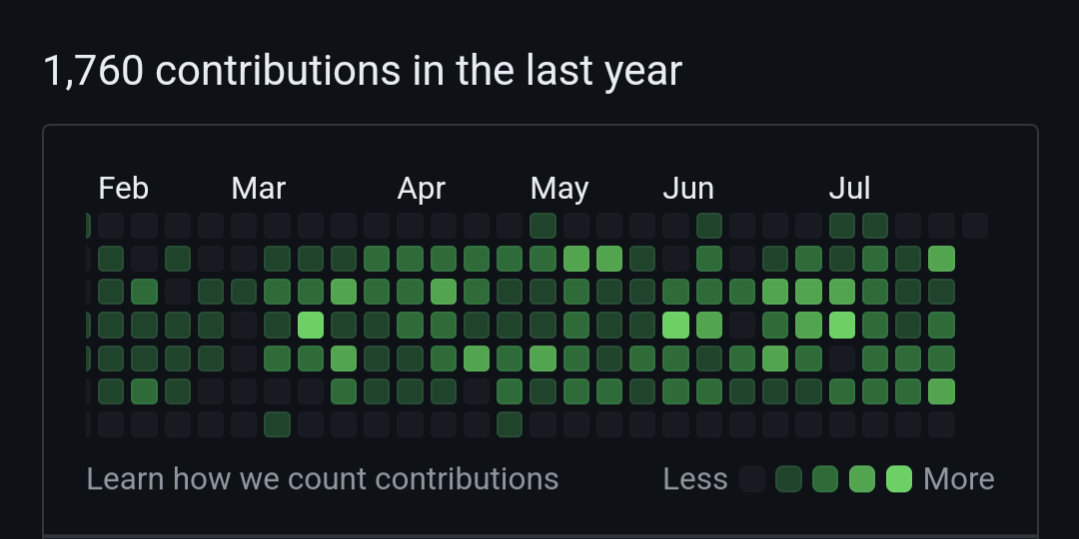- 0 Posts
- 40 Comments

 6·2 months ago
6·2 months agoI think OP measure of success was getting a job. I think they are wrong because I hear about lots of folks doing cool things. But I get where they are coming from.

 9·2 months ago
9·2 months agoI think folks saying you don’t need math are right. But if you are having trouble with college algebra you might have trouble with CS. Or the teacher is bad.
Math really builds on itself at the stage where you are. Without good algebra calculus isn’t going to work well.
I’d try a different teacher. Online courses or repeating the course with another professor or something.
I’m late to this, but could a kind soul explain what I’m missing out on by using urxvt? I settled on it years ago and haven’t changed anything.

 22·3 months ago
22·3 months agoI’ve learned a lot by breaking things. By making mistakes and watching other people make mistakes. I’ve writing some blog posts that make me look real smart.
But mostly just bang code together until it works. Run tests and perf stuff until it looks good. It’s time. I have the time to write it up. And check back on what was really happening.
But I still mostly learn by suffering.

 3·3 months ago
3·3 months agoI just have to say “tastes like c” is a visceral way to say it. I approve.
I’ve stopped using
stashand mostly just commit to my working branch. I can squah that commit away if I want later. But we squash before merge so it doesn’t tend to be worth it.It’s just less things to remember.

 3·4 months ago
3·4 months agoI’m just a hacker. I’ll never be a thought leader. But I am passionate about my work. And my kids.
I love solving the problems. I have a few posts on the company blog but they put a chat bot on it a while back and didn’t care that it felt offensive to me.
But I’m here, reading this. Maybe I’m grey matter.
I feel lucky to have avoided this so far. It’s really not like this on my team. I write a fair bit of code and review a ton of code.
It’s cute. Maybe my favorite use of ai I’ve seen in a while.
I wish it looked at contributions instead of just the profile page. Much more accurate roasting.

 10·6 months ago
10·6 months agoMine looks a little like that. It’s my job though. Everything’s on GitHub.


 3·6 months ago
3·6 months agoI think the technologies are pretty bubble based. We are 80/15/5 Mac/Linux/Windows and it’s been 15 years since I worked on a software team that’s thats mostly windows. But I talk to them from time to time. But if anything Mac feels underrepresented compared to my bubble.
I admit I’m probably biased in favor of believing the survey is representative. I work on one of the databases.
Speaking of databases, I don’t work on SQL Server but can see the appeal. It implements a huge array of features and it’s documentation is pretty good. Folks have told me it’s a lovely database to use.

 2·6 months ago
2·6 months agoGood for them!

 1·7 months ago
1·7 months agoUsually I use glob patterns for test selection.
But I did use reges yesterday to find something else. A java security file definition.

 2·7 months ago
2·7 months agoThanks. I remember one of these had people being excited about it and I felt bad that I couldn’t try it. But Linux is hard and we are all so grumpy. I get it.

 2·7 months ago
2·7 months agoIs that the Mac only one?

 3·8 months ago
3·8 months agoDo folks still use logstash here? Filebeat and ES gets you pretty far. I’ve never been deep in ops land though.

 3·8 months ago
3·8 months agoThe point of the license combination they use is to allow the enterprise version to be open and live in the same repo as everything else. Dunno if that’s what they do, but that’s why the elastic license exists.

 10·8 months ago
10·8 months agoThe only surefire way is to read it all. And understand it all. That ain’t happening though. So you decide how much to do.
You should figure out how many people are landing patches and get a rough sense of why. Same for folks filing issues or talking about the project in general. Maybe you trust one of the contributors for some reason. Either way, you want to know how alive the project is.
You could land a patch.
You could spot check parts of the code.
You could run vulnerability scanners on it.
I dunno. It’s hard.
Zero cost abstractions are a hell of a thing.